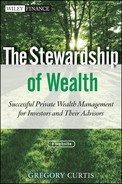Part One
The Importance of Private Capital
The role of private capital is poorly understood, both by Americans in general and also by the wealthy Americans who own that capital. Most wealthy families take the stewardship of their capital seriously, to be sure, seeing stewardship as the discharge of an important duty to their families. But beyond the importance of wealth to its owners, substantial families can legitimately wonder if private wealth is a positive or negative feature of American life. Families who work hard to maintain and grow their wealth often see their work as an intensely private activity existing outside of, unrelated to, and largely irrelevant to the major thrusts of U.S. society—a kind of fringe element in the American democracy. Nothing, however, could be further from the truth.
The building of wealth, the management of wealth, and the deployment of wealth are activities that lie at the very heart of what has made America great. Abundant private wealth is what distinguishes America from other free market democracies. It is the lure of wealth that encourages Americans (and would-be Americans) to develop and implement the ideas that drive contemporary civilization, whether those ideas are in business, science, the arts, education, entertainment, or almost any other activity that we value as human beings.
And it is the creative deployment of wealth that enriches American society far beyond the dreams of other civilizations—including other modern, postindustrial democracies. These two characteristics of wealth—its ability to bring out the competitive best in citizens and its enriching qualities that permeate society—are at the center of the special American version of free market democracy, and they are largely responsible for America's preeminence. Lying between these two aspects of wealth, and the linchpin that holds them together, is the management of private wealth. If wealth were simply created and then dissipated, it would be of little use to its owners. Far more important, it would be of little use to society.
Parts Two and Three of this book are focused particularly on the management of wealth—on the linchpin. But in Part One, I focus on the first two characteristics of wealth. Thus, Chapter 1 emphasizes how America differs from its free market cousins in the continuing encouragement of its citizens to pursue wealth. As a result, American competitiveness is the wonder of the world. In Chapter 2, I turn to the deployment of wealth—the creative use of private capital that gives this book its title.
The ultimate point of Part One is to demonstrate that wealthy families lie at the very center of the American experiment—something that is very poorly understood. Private capital is an essential, even a definitive aspect of the American version of democratic capitalism. Without private capital on a grand scale—the lure of accumulating it and the creative use of it—it would be impossible to imagine America.
Wealthy families need to be both proud of what their families have accomplished and proud of what their capital can and will continue to accomplish for America and for the world. Private capital has made America the most vigorous, the most creative, the most diverse—in short, the most powerful society ever organized. And given the increasingly feeble state of other liberal societies around the world, it is the vigor of America, and only the vigor of America, that offers hope for freedom and democracy anywhere on the globe. If America declines, freedom and democracy will have no champion worthy of the name. And the best way to ensure the decline of America is to reduce the role that private capital plays in our remarkable success.
